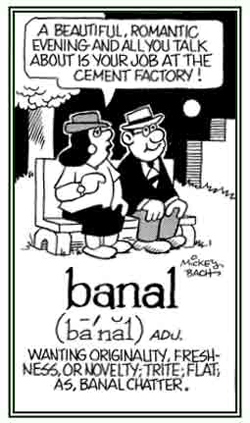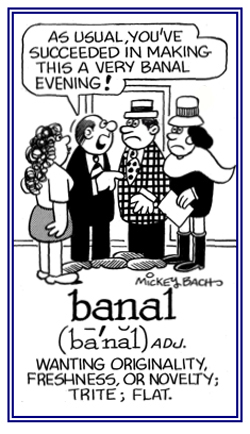You searched for:
“banal”
banal (buh NAL, BAY nuhl, buh NAHL) (adjective), more banal, most banal
1. Descriptive of something boring, unoriginal, or stale: There were no new ideas in the politician's banal speech.
2. Dull, especially due to overuse or over familiarity: The editor rejected the author's work because it was too trite and banal.
3. Etymology: banal comes from an old meaning of ban, "force of vassals called to arms", hence, "common folk".

© ALL rights are reserved.

© ALL rights are reserved.
Go to this Word A Day Revisited Index
2. Dull, especially due to overuse or over familiarity: The editor rejected the author's work because it was too trite and banal.
3. Etymology: banal comes from an old meaning of ban, "force of vassals called to arms", hence, "common folk".
The ending -al was later added to form an adjective: banal. In medieval France and England, a banal mill was a mill where feudal tenants were legally obliged to have their wheat ground, and the banal oven was where bread was baked; at rates fixed by the landlord.
The word almost died out, but was revived in the 18th-century journalese as a synonym for "vulgar" or "commonplace" from its association with the common people. It has been generalized through "open to everyone" to "commonplace, ordinary", then to "trite, petty".


Go to this Word A Day Revisited Index
so you can see more of Mickey Bach's cartoons.
This entry is located in the following unit:
English Words in Action, Group B
(page 2)
A reference to something that is boring, trite, unoriginal, or of no interest to others. (2)
This entry is located in the following unit:
Word a Day Revisited Index of Cartoons Illustrating the Meanings of Words
(page 17)
